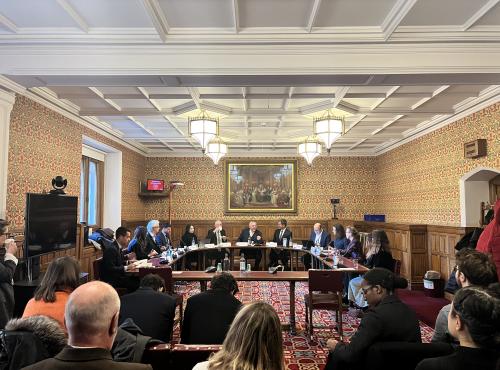AI and Ethics: Reactions Roundtable to AI White Paper
On 19th April 2023 Policy Connect, through the All-Party Parliamentary Group on Data Analytics (APGDA), held a First Reactions roundtable following the publication by the Department for Science, Innovation and Technology of the White Paper ‘A pro-innovation approach to AI regulation’.
The event was chaired by Lord Tim Clement-Jones and held under Chatham House rules. Introductory remarks were made by David Leslie, the Alan Turing Institute; Carly Kind, Ada Lovelace Institute; Stuart Holland, Equifax; and Adam Leon Smith, BCS, The Chartered Institute for IT. Participants included a range of stakeholders across industry, academia and the third sector, and from government.
The discussion was set within the context of a daily diet of commentary on AI advances and risks, such as Government Communications Headquarters (GCHQ) warning of AI cyber risks; the letter from the 1000 technologists recommending a pause on experimentation; the outcry leading to Spotify and Apple removing an AI-generated song mimicking living musicians; and numerous examples of ChatGPT making up libellous stories about individuals, demonstrating its current inability to distinguish fact from fiction.
There was a feeling of some disappointment in the White Paper (WP): the meeting considered that the huge potential for the UK in creating AI companies through investment in the UK (rather than losing start-ups to US buy-out) needed action at greater speed and scale, with commensurate investment of cash and resource. While the diagnosis is reasonable, there is a level of superficiality in the solutions offered.
Participants welcomed the alignment of principles with those of the Organisation for Economic Co-operation and Development (OECD) signed up to by many countries, and the emphasis on the importance of standards. But there is no specificity to help operationalise the principles, and other elements of a governance and regulation ecosystem are lacking. This is a particular gap from the citizen/user perspective. It was felt disappointing that a number of sectors would be left without a regulator because of the desire not to create a new one, while in other sectors the existing multiplicity of regulators would be problematic for operators, especially SMEs. There was agreement that a central body should be developed but that it would need to be strong, with power and teeth, and not in central government. Participants noted that statutory backing was mentioned but only as a possibility in due course, and many felt that this was too slow and timid.





